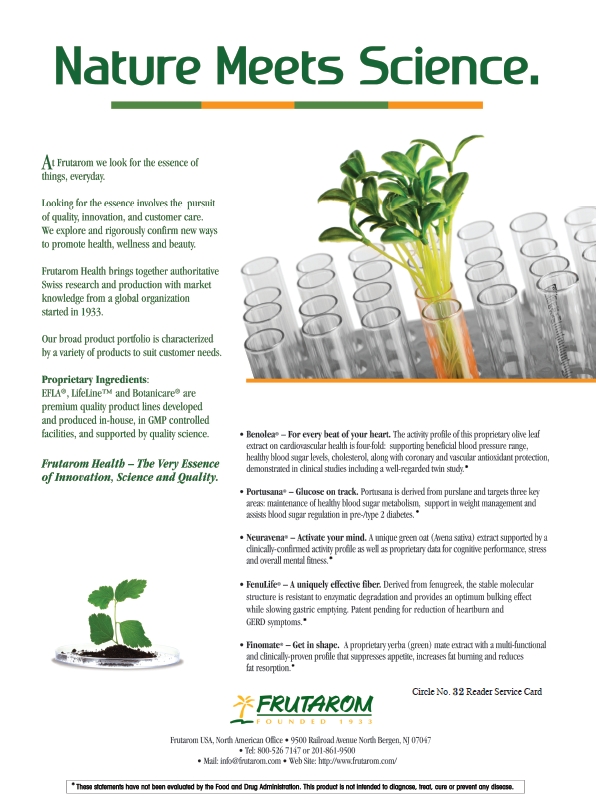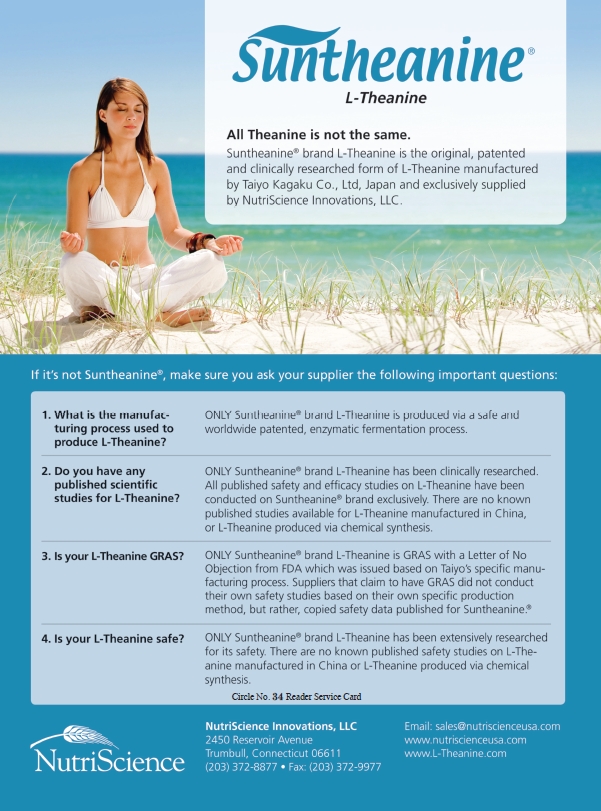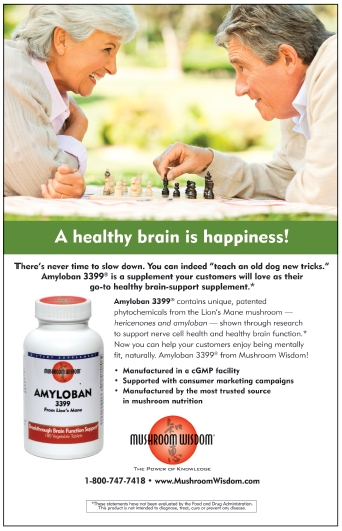Five million Americans are living with Alzheimer’s disease, the most prevalent form of dementia (1). Millions of others are dealing with other types of dementia and countless others do not yet know their “forgetfulness” is something much worse.
Dementia, a debilitating progressive disease, is one of the most dreaded diagnoses one can receive. Affected individuals experience severe memory loss (particularly with short-term memory) and declining metal ability. As the disease advances, communicating with others becomes difficult and caring for oneself becomes impossible. Many even lose the ability to recognize loved ones.
Needless to say, this disease takes an
 enormous toll on affected individuals and their families and friends. The disease has no cure, but research groups are taking a good hard look at how natural compounds may be able to help. While dietary supplements cannot claim to cure, prevent or treat dementia or Alzheimer’s disease, it is certainly worth a look at the botanicals that have piqued the interest of dementia researchers.
enormous toll on affected individuals and their families and friends. The disease has no cure, but research groups are taking a good hard look at how natural compounds may be able to help. While dietary supplements cannot claim to cure, prevent or treat dementia or Alzheimer’s disease, it is certainly worth a look at the botanicals that have piqued the interest of dementia researchers.What Causes Dementia?Researchers have pieced together some likely causes of dementia, which will help you understand how botanicals may affect the disease during clinical trials.
Damaged brain cells that cannot communicate properly with one another may be responsible for dementia symptoms, and different types of damage are associated with the various forms of the disease. For instance, most Alzheimer’s disease patients have large amounts of beta-amyloid plaques in and around their brain cells, which hampers communication and damages the part of the brain where memory and learning functions occur.
Other abnormalities in brain tissue occur with Alzheimer’s, too. Threads of tau protein inside cells carry vital nutrients in and out of cells. This protein is tangled in an Alzheimer’s disease patient’s brain cells, which may lead to malfunctioning cells and their premature death (2). Inflammation is also a factor in the disease.
Meanwhile, vascular dementia may be caused by damage to blood vessels (3). This might be initiated by reduced or blocked blood flow to the brain (like during stroke) or even type-2 diabetes due to the way the body responds to insulin.
 Rising Nutrient StarsMany research efforts have centered around how natural compounds can affect some of these physical changes in the brains of dementia patients. More research is needed to prove that natural compounds are effective at improving one’s chances of beating dementia, but the data are promising.
Rising Nutrient StarsMany research efforts have centered around how natural compounds can affect some of these physical changes in the brains of dementia patients. More research is needed to prove that natural compounds are effective at improving one’s chances of beating dementia, but the data are promising.Lion’s mane. According to mushroom expert Paul Stamets, more than a dozen studies have linked lion’s mane mushroom to nerve regeneration and benefits for those experiencing cognitive decline. In a small-animal study, mice with amyloid plaque like that seen in Alzheimer’s patients showed impaired memory. Of those given lion’s mane for 23 days, many regained some cognitive capacity and were better able to finish a maze (4).
Of note, those that took the mushroom had reduced beta-amyloid plaque in the brain (4).
Curcumin. Experts say rates of Alzheimer’s disease are among the lowest in India (5). Some believe the reason why could be that this population consumes a diet rich in turmeric, which is a source of the antioxidant curcumin. Studies suggest that curcumin may help reduce inflammation and beta-amyloid plaque buildup. One trial, for instance, found that curcumin in combination with vitamin D helped the immune system to clear neurons of the protein (5).
Since curcumin is not readily bioavailable, shoppers should be encouraged to buy branded ingredients that address this issue by combining it with piperine, enhancing its solubility or protecting it from hydrolysis (6).
Vitamin E.Researchers recently linked vitamin E deficiency (including total tocopherols and total tocotrienols) with Alzheimer’s disease, and found that having adequate levels in the bloodstream helps reduce the risk of developing the disease (7).
Some physicians believe the research behind vitamin
 E for cognitive health is so compelling that they recommend patients take it to treat cognitive Alzheimer’s symptoms (8). Large doses of this powerful antioxidant “delayed loss of ability to carry out daily activities and placement in residential care for several months” in a monumental 1997 study (7).
E for cognitive health is so compelling that they recommend patients take it to treat cognitive Alzheimer’s symptoms (8). Large doses of this powerful antioxidant “delayed loss of ability to carry out daily activities and placement in residential care for several months” in a monumental 1997 study (7).Omegas.Omegas are well known for supporting brain development and cognitive health. Some also believe omega-3s may help prevent certain forms of dementia. A study followed what 1,219 Alzheimer’s-free individuals ate for more than a year and their blood was tested for beta-amyloid. It turned out that the more omega-3s one consumed, the less beta-amyloid in the blood. According to the researchers, taking in one extra gram of omega-3 daily was associated with 20–30% lower blood beta-amyloid levels (9). The data were published in Neurology.
Some theorize the reason why omega-3s might lower dementia risk is a combination of support for vascular health, anti-inflammatory effects and protection of nerve cell membranes.
Cocoa.Cocoa in supplement form has also been studied for its brain health benefits. This past summer, an Italian research team published data suggesting the phenols in cocoa powder activate the brain-derived neurotropic factor (which controls neuron development and function) survival pathway in plaque-treated cells. In a nutshell, the process stopped simulated neurodegeneration (like that seen in Alzheimer’s disease patients) (10). Other research found that drinking flavanoid-rich cocoa improved blood flow to the brain by an average of 8%(11).
Magnesium. Magnesium is recognized for stress support, and new data suggest it could also benefit those looking for cognitive health support. A recent study of those with mild-to-moderate
 Alzheimer’s disease found that participants with the most severe impairment were also the individuals with the lowest magnesium levels (12).
Alzheimer’s disease found that participants with the most severe impairment were also the individuals with the lowest magnesium levels (12).Other new data indicate that magnesium helps prevent synapse loss, which is also associated with Alzheimer’s disease (13). The brain relies on synaptic connections to retrieve memories. While their degradation is a normal part of aging, the process occurs much more rapidly in those with Alzheimer’s disease.
Vitamin C.Vitamin C’s benefits on the immune system are much more far-reaching than simply avoiding colds. Researchers tested brain tissue of mice with Alzheimer’s disease that was laden with amyloid plaque. They found that vitamin C helped dissolve these proteins (14). Other data indicate vitamin C and beta-carotene levels in Alzheimer’s patients are much lower than those in healthy individuals (15).
The research connecting natural compounds with Alzheimer’s support is encouraging and ongoing. While researchers have not discovered a cure for Alzheimer’s disease (be it natural or pharmaceutical), the important data presented here may be a window into the world of dementia therapeutics one day.WF
References1. Alzheimer’s Association, “Alzheimer’s Facts and Figures,”www.alz.org/alzheimers_ disease_facts_and_figures.asp, accessed Dec. 17, 2013. 2. Mayo Clinic, “Alzheimer’s Disease: Causes,” www.mayoclinic.com/health/alzheimers-disease/DS00161/DSECTION=causes, accessed Dec. 17, 2013. 3. Mayo Clinic, “Diabetes and Alzheimer’s Disease,”http://www.mayoclinic.com/health/diabetes-and-alzheimers/AZ00050, accessed Dec. 17, 2013. 4. P. Stamets, “Lion’s Mane: A Mushroom that Improves Your Memory and Mood?” Huffington Post, Aug. 8, 2012,www.huffingtonpost.com/paul-stamets/mushroom-memory_b_1725583.html, accessed Dec. 17, 2013. 5. “Curcumin for Alzheimer’s?”www.drweil.com/drw/u/QAA401349/Curcumin-for-Alzheimers.html, accessed Dec. 19, 2013. 6. “Curcumin,” Mary S. Easton UCLA Alzheimer Translation Center,http://alzheimer.neurology.ucla.edu/Curcumin.html, accessed Dec. 19, 2013. 7. “Vitamin E Deficiency Linked to Alzheimer’s,”WholeFoods Mag., Mar. 2012. 8. Alzheimer’s Association, “Medications for Memory Loss,”www.alz.org/alzheimers_disease_standard_prescriptions.asp, accessed Dec. 19, 2013. 9. “Eating Fish, Chicken, Nuts May Lower Risk of Alzheimer’s Disease,” press release distributed May 2, 2012,www.eurekalert.org/pub_releases/2012-05/aaon-efc042512.php, accessed Dec. 19, 2013. 10. “Cocoa May Help Thwart Neurodegeneration”WholeFoods Mag., July 2013. 11. Alzheimer’s eNews, Aug. 14, 2013,www.alz.org/enews/081413.html, accessed Dec. 19, 2013. 12. M. Barbagallo,et al., “Altered Ionized Magnesium Levels in Mild-To-Moderate Alzheimer’s Disease,”Magnesium Res.(24) 3, 115–121 (2011). 13. W. Li,et al., “Elevation of Brain Magnesium Prevents and Reverses Cognitive Deficits and Synaptic Loss in Alzheimer’s Disease Mouse Model,”J. Neurosci. 33 (19), 8423–8441 (2013). 14. “Treatment With Vitamin C Dissolves Toxic Protein Aggregates in Alzheimer’s Disease,”ScienceDaily, Aug. 18, 2011,www.sciencedaily.com/releases/2011/08/110818101645.htm, accessed Dec. 19, 2013. 15. “A Link Between Vitamin C and Beta-Carotene and the Prevention of Alzheimer’s Disease,”WholeFoods Mag., Nov. 2012.
Published in WholeFoods Magazine, February 2014










